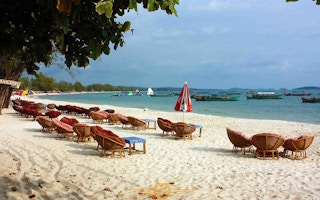An environmental watchdog on Thursday called on Cambodia’s government to shut down a Chinese-owned hotel and casino for pouring raw sewage into the sea off of the coast of the popular resort town of Sihanoukville, following the closure of another on the same island last month.
In a video posted to Facebook, Mother Nature activist Meng Heng said the Sunshine Bay Hotel and Casino is severely polluting the water off of the southern tip of Koh Rong Samloem Island’s Independence beach.
Overhead footage shot with a drone camera clearly shows a large stream of discolored water snaking through the beach behind the resort and spilling into the sea.
He noted that the sea near the hotel and casino has “an unusual odor and color to it,” adding that as one approaches the perimeter of the property “we will be left in no doubt as to why this part of the beach receives no tourists.”
While Meng Heng acknowledged that it was impossible to tell whether all of the pollution comes solely from the hotel, it is clear that “large amounts of sewage are being dumped onto this part of the beach on a daily basis.”
In mid-March, officials ordered another Chinese-run facility of Koh Rong Samloem—the Jin Ding Hotel and Casino—to shut down, citing multiple violations by the casino of the law, the playing of loud music on the beach, and the promotion of illegal online betting games.
“
We want investors to bring development, but we don’t want them to harm the environment.
Or Saroeun, provincial spokesman, Sihanoukville
The closure followed accusations that the resort was ruining the beauty of a local beach by pouring raw sewage into the sea, prompting complaints by area residents and inspections by authorities.
At the time, Leang Sopheary—a youth volunteer who visited the island in February and posted photos of the polluted water on social media—called on authorities to examine larger areas of beachfront now also under threat.
Another environmental activist, Thorn Ratha, called for a “serious punishment” for the Jin Ding’s owner, as well as an investigation into any government official “who might have been involved” in turning a blind eye to the violations.
Call for closure
In Thursday’s video, Meng Heng noted that on March 26, Minister for Urban Planning Chea Sophara had said in a statement posted to his Facebook account that in the aftermath of the Jin Ding’s closure “Sihanoukville no longer has any dirty water entering its beaches and sea,” but the activist questioned whether the minister had actually sent anyone to inspect the area before making such claims.
He urged Prime Minister Hun Sen’s government to act against the ongoing problem of pollution in the area, starting with the Sunshine Bay Hotel and Casino.
“Will Hun Sen’s regime dare to also shut down another Chinese business, the massive Sunshine Bay Hotel and Casino, if it finds that it is also spewing raw sewage onto the sea, in much larger quantities than the one in Koh Rong Samloem,” he asked.
On Thursday, Sihanoukville provincial spokesman Or Saroeun acknowledged to RFA’s Khmer Service that “sewage is a problem,” but said Sihanoukville city officials are “working to resolve the issue.”
He said authorities are targeting serious polluters first, and that they will issue warnings to any buildings found in breach of the city’s regulations before punishing them for continued violations.
“If we find out they are violating the laws [against polluting the environment], we will ask them to correct the situation,” he said.
“We want investors to bring development, but we don’t want them to harm the environment.”
Chinese investment has flowed into Sihanoukville in recent years, but Cambodians regularly chafe at what they say are unscrupulous business practices and unbecoming behaviour by Chinese residents.

















